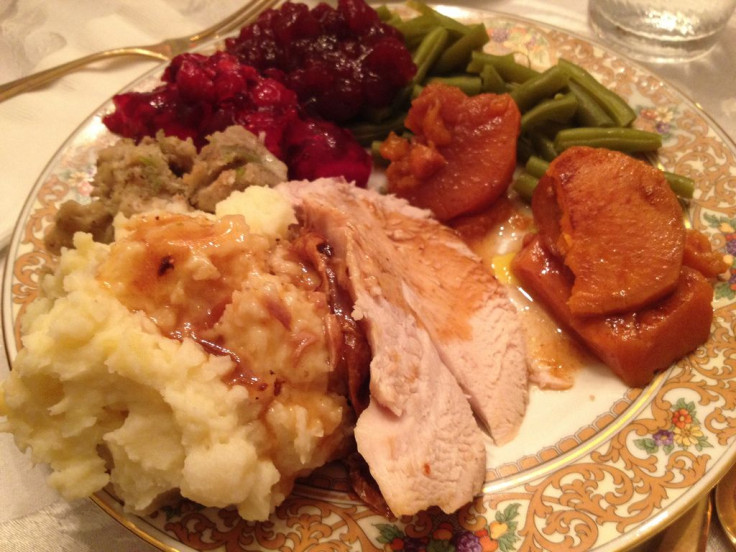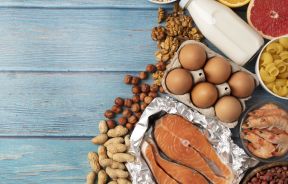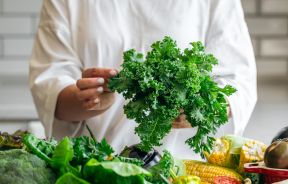How To Avoid Gaining Weight During The Holidays: Tips On Getting Through Your Thanksgiving Meal Without Packing On The Pounds

The holidays are upon us, and with them comes the perfect storm for weight gain: lots of food, cocktails, and high levels of stress. But packing on the pounds doesn’t have to be an inevitable facet of the holiday celebrations — avoiding it may actually be easier than you think.
Food is an absolutely necessary part of life, regardless of what or how you eat. Once digested, it’s converted into energy to power cells, which are responsible for everything from keeping our heart beating to pumping air into our lungs, to helping us move. However, the amount of calories a person needs depends on their own individual body — someone who’s highly active will likely need more calories, while someone who tends to be sedentary needs less.
It’s when we eat more than we need that calories are turned into fat and stored for later use, Mary Jane Detroyer, a registered dietitian in New York City, told Medical Daily in an interview. Enough of this excess fat can then lead to weight gain. But this process doesn’t happen overnight or from only one day of indulgence.
“When the average person eats a larger meal than general, then steps on the scale the next day, they are seeing a fluid shift,” Detroyer said. “It’s water in their muscles. It will go away.”
What's Actually Happening During The Holidays
The average Thanksgiving meal is packed with sodium, all of which enters the bloodstream. Sensing this, the kidneys respond by retaining extra water in order to maintain a healthy sodium-blood concentration. This is considered water weight, and it’s not necessarily permanent; Detroyer says it usually goes away once we return to our normal eating habits.
Eating lots of carbohydrates stimulates a similar response. Carbs that aren’t used immediately are turned into glycogen and stored away for later energy use. The body needs about 3 to 4 grams of water for each gram of glycogen it stores, however, which explains why we gain water weight after eating all those biscuits during the holidays.
Although one day of indulgence probably won’t cause any noticeable physical changes, overeating during the entire holiday season might. Even if you're watching what you eat during the holiday season, weight gain can still sneak up on you through excessive alcohol consumption, which typically occurs at various holiday parties.
“When you drink alcohol, your inhibitions are lowered and you’re less inclined not to eat,” Detroyer explained. Detroyer added that alcohol also inhibits the body’s ability to digest food, causing it to sit in the intestines for longer. Alcohol is also full of calories, and the acetate in alcohol reduces the body’s ability to burn fat. Altogether, alcohol makes it easier to gain weight. Good Housekeeping magazine notes many successful dieters avoid alcohol entirely during the holiday season to prevent excess weight gain.
As stressful as managing all this food and alcohol is, it’s best that you try not to stress. Detroyer says the meals and drinks have nothing on stress when it comes to holiday weight gain. “During this time of year, people are stressed, and stress can cause people to eat more. Many people gain weight because they eat for the wrong reasons,” Detroyer explained. What’s more, the stress hormone cortisol makes the body hold onto calories for longer, making it even harder to burn off the excess fat.
Battling The Bulge
With the odds stacked against us on all fronts, how do we avoid weight gain during the holidays?
Contrary to popular belief, skipping meals in order to reduce caloric intake will only make things worse, Lisa Moskovitz, a registered dietician at the NY Nutrition Group in New York City, told Medical Daily in an email. “The hungrier you are going into the meal, the faster you’ll eat and the more you’ll load on your plate,” she said. “Snack on fresh fruits and veggies throughout the day to keep your belly full on few enough calories that you’ll still have room for all your favorite foods during the meal.”
Detroyer also suggests taking time to acknowledge your food and appreciate the eating process, rather than quickly scarfing it down. This will help you eat until you're satisfied but not until you’re full, which in turn can help you reduce your total calorie intake.
“Mindful eating is the practice of paying attention to what you’re eating. … When you’re eating mindfully you enjoy it, savor it, take time to appreciate it,” Detroyer said. As a result of mindful eating, you’ll feel more satisfied from your meal and therefore eat less.
Research has also shown drinking water before and during a meal can reduce the chance of overeating. Adhering to an exercise routine can also help to offset the additional calories you end up consuming. “Keep active by starting the day off by breaking a sweat at the gym or by jogging around the block,” Moskovitz said. For those who aren’t ready for this level of physical activity, she added, simply helping to set the table or clean up after dinner also counts as physical activity, and can subsequently lead to less overeating.
If you’re in charge of holiday cooking, there are many subtle modifications you can make to your food so it comes out healthier. Use skim milk instead of whole in mashed potatoes or skim the fat out of the gravy, for example. Moskovitz also suggests adding at least two healthy sides, like “sauteed spinach, a big colorful salad, or baked sweet potatoes.”
Keeping slim and avoiding weight gain may be more difficult over the holiday season, but it is far from impossible. Yet, despite the importance of staying healthy, watching your diet shouldn’t take away from your overall holiday experience, Moskovitz said. “As long as you get back on track the very next day, no harm, no foul.”



























